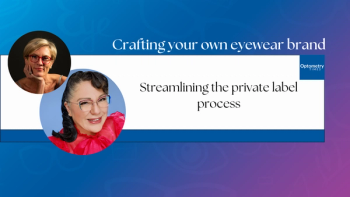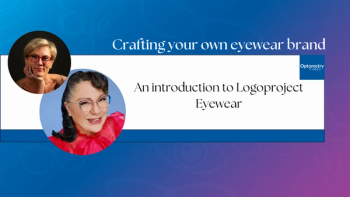
How patient care resembles parenting
Sometimes you have to let them fail to make a point.
The views expressed here belong to the author. They do not necessarily represent the views of Optometry Times or UBM Medica.
I have teenagers, and I admit that sometimes they try my patience.
Being the “fixer mom,” I am the parent my children call when they forget their lunch/homework/backpack/gym clothes at home. This is because I am the more likely parent to bring them what was forgotten due to my more flexible schedule and soft heart. This is also because my psychiatrist husband does not answer his phone while at work.
Maybe I should try that.
As my children became preteens and now teens, I have tried to put my foot down to these “911” requests because they stress me out, make my day hectic, and make me generally cranky. My children never say, “Thank you.”
Previously from Dr. Schroeder-Swartz:
I am getting better at letting them get a poor grade on missing homework or making them eat hot lunch when they hate the food offered but overslept and could not make their lunch that morning.
It does not happen often, and these 911 calls become less frequent the longer I refuse to come to their rescue. They are less likely to repeat the mistake, especially when the consequences of their mistakes are significant.
Sometimes you have to let them fail to make a point.
Let patients fail
It occurred to me to apply this to my patient management.
For example, I have a female patient with mild vision loss secondary to macular degeneration. She had worn monovision contact lenses for many years, and she wanted to return to them.
Related:
I explained that typically monovision does not work well when both eyes are not capable of 20/20 vision.
She begged. She pleaded.
I explained the fees and again reiterated that I did not think a monovision fit would be successful.
She begged and pleaded and got me at least 15 minutes behind in clinic.
I fit her with a pair of daily wear lenses with monovision correction. They did allow her to legally drive, but I was not optimistic.
After seven trial pairs of contacts lenses and visits over six months, I put my foot down.
One week later, she presented reporting losing a lens in her eye and inability to see distance with her lenses. Upon careful inspection, the lens was stuck in place and required proparacaine for removal. She was 20/30 at distance at near.
I took a deep breath (so as not to scream, “I told you this would not work”) and told her that I was concerned that removing the lenses was so problematic.
She responded, “Oh, I am better at it at home.”
I asked where she was when she called this morning about the lens stuck in her eye. Of course, her response was, “At home.”
I put on my “Dear child, I love you but I am going to kill you” face and informed her that we were done with that lens brand. I gently reminded her that monovision was not working due to her limited vision, and we needed to go with distance vision in thicker contact lenses with reading glasses to maximize the vision. We had given it a good try, but after this much time my magic bag of tricks was empty.
She relented.
Boom goes the dynamite.
Much like when my child forgets his homework, I hope it sticks and she does not ask for monovision in six months when she returns for her general exam.
Related:
Try it the patient’s way
I have patients who may disagree with my diagnosis or treatment plan, and I make my case for why I am right.
I think, “I am the doctor. I went to optometry school. You did not go to optometry school, and Google is not eye doctor school. I have been treating these problems for many years. I lecture on this topic. I have written books. I have lots of letters after my name. I have more letters after my name then you do in your whole name.”
I do not say this, but I think it very loudly in all capital letters.
I reiterate my point about why my treatment plan would be beneficial. But, some patients have to figure it out on their own.
Provided their preferred plan of action does not put them in harm’s way, you may want to consider letting them.
I have patients who do not want to take their glaucoma drops. I explain that without the drops, their pressure will go up.
Patient A: “But I do not like to take them.”
Patient B: “They sting.”
Patient C: “They are expensive.”
Admittedly, these are all valid complaints.
Option 1: Bore them to death with explanations of how their pressure needs to be reduced to prevent glaucomatous damage.
Option 2: Let them stop the drops for two to three weeks, then them return for a pressure check. The pressure goes up. They get what they wanted (no drops for two to three weeks), and I get what I wanted (an elevated intraocular pressure [IOP] and verification to everyone involved that the drops are required.)
My dry eye patient does not want to take her artificial tears anymore.
OK, stop everything, and see me in three weeks. Check topography and take pictures of her eyes when she comes back with itchy, red, burning eyes and prove to everyone she needs the drops.
Boom goes the dynamite.
Just to be clear, this will not work on amblyopia.
Related:
Sometimes it works
I have been surprised a few times.
One patient wore monovision contact lenses and requested monovision spectacles.
Optometry 101: Monovision spectacles do not work.
To discourage the patient from going through with the order, we required her to sign a form stating that we would not remake the lenses. She wasn’t having it and paid for her monovision glasses.
She loved them.
When I saw her the next year, I said she had the most flexible brain on earth. I told her not to tell anyone we ordered monovision spectacles for her because I was afraid people with less flexible brains would be jealous of her. I could not imagine what my optician would do if word got out that we made monovision glasses. Pandemonium would ensue.
The patient was happy, and I was happy she was happy. And she will never get her glasses anywhere else.
Boom goes the dynamite.
Newsletter
Want more insights like this? Subscribe to Optometry Times and get clinical pearls and practice tips delivered straight to your inbox.













































.png)


